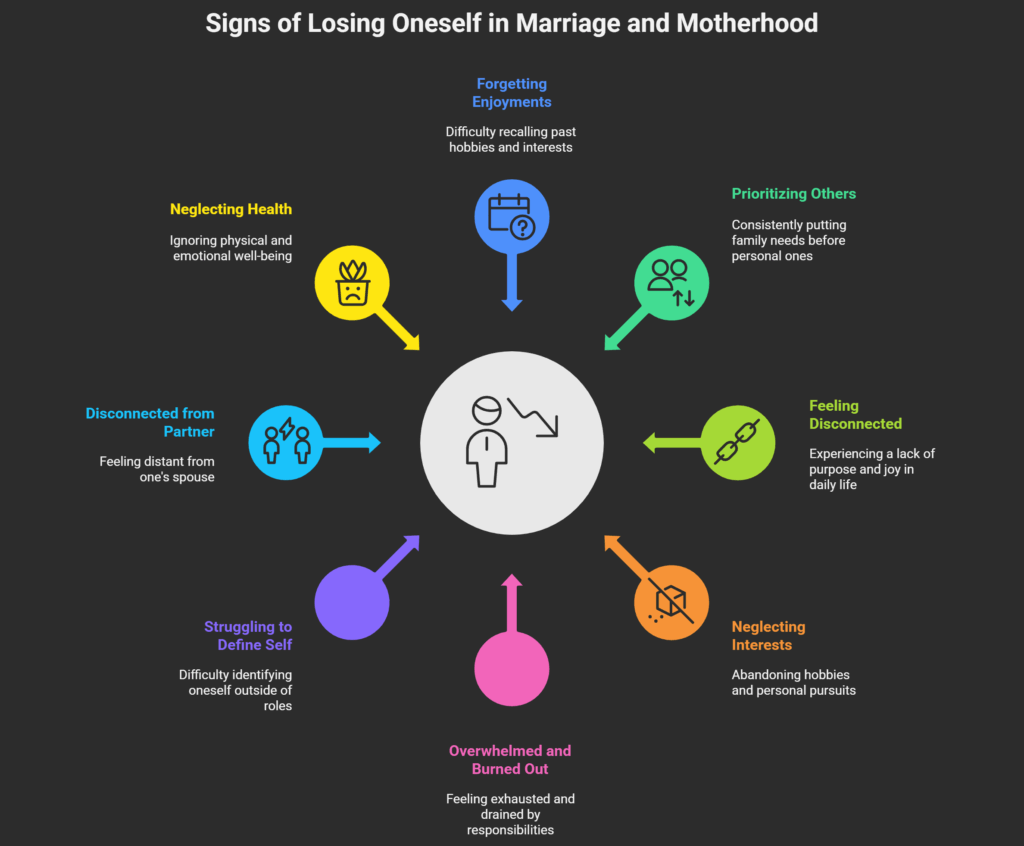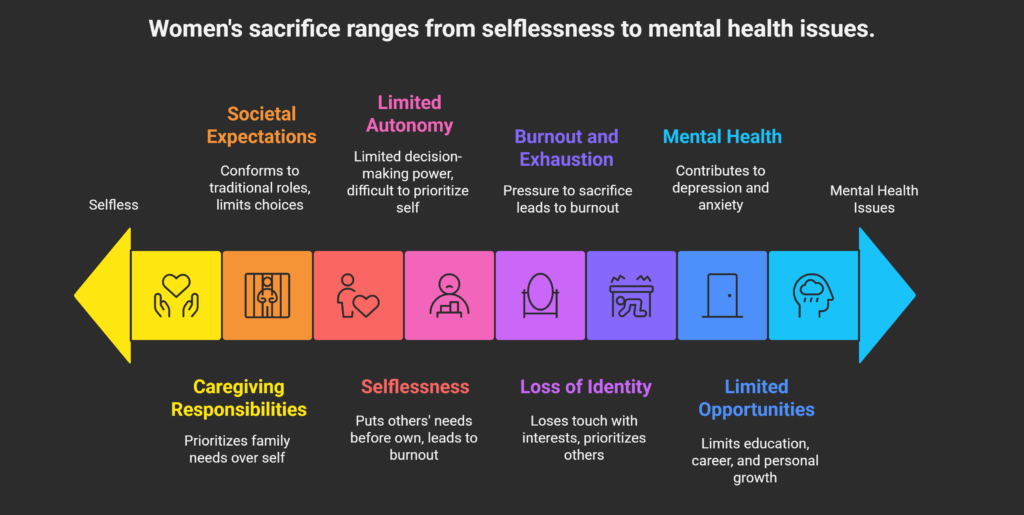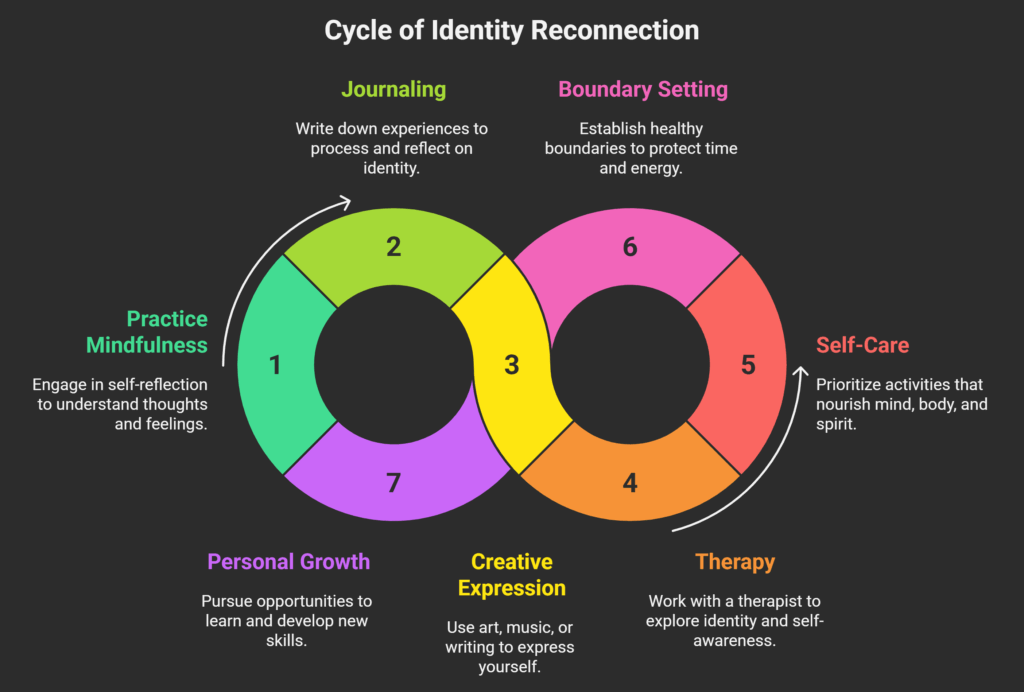
Mental health support for Malayali women after marriage and motherhood is more important today than ever. Many women silently struggle with identity loss, emotional exhaustion, and mental pressure after stepping into these life-changing roles. Without open discussions or professional guidance, their well-being often suffers in silence.. They may have had big dreams and aspirations when starting a new life, envisioning a happy and fulfilling existence with a supportive partner and family. However, for various reasons, the societal context in India does not adequately support women in living their own lives, discovering their identity, or balancing family and work responsibilities.
- Despite undergoing many changes, the current state of Malayali women after marriage is still pitiable, as indicated by recent news.
- Many women are driven to suicide due to dowry-related issues, beauty standards, and responsibilities, among other forms of domestic violence.
- The societal expectations, pressure to manage responsibilities, and the way society and family treat women can all contribute to women’s mental breakdown.
- The unfortunate reality is that women often remain silent when they lose themselves in such situations.
- Due to the inability to achieve their desired life and facing domestic violence and mental abuse, women experience significant mental distress.
- However, women and their families have not yet shifted towards openly discussing these issues or seeking professional help. If women feel lost after marriage or motherhood and struggle to live their own lives, seeking professional help is crucial.
Through counseling and therapy, women can lead their lives in a more joyful and meaningful way. These therapies can help women find meaning in their lives, remind themselves of who they are, and approach life in a positive way.
To learn more about the challenges women face after marriage or motherhood, including the reasons behind their loss of identity and how to overcome them, read on…
The Invisible Crisis of Losing Yourself
During counseling sessions, women often share a common experience. After marriage, they find themselves stuck in a routine, performing the same tasks daily. They wake up, prepare meals, get their husbands ready for work, feed their children, and spend their days caring for their kids without pursuing a career outside the home. In the process, they often forget about their own happiness, desires, hobbies, and even their favorite foods.
This is a typical scenario for many women in Kerala. Despite changes over time, women still tend to prioritize their responsibilities over their own needs and desires, leading to a loss of personal identity and happiness.
societal Expectation
The Malayali perspective on family is very clear.
Do you remember the heroine from the Malayalam movie “The Great Indian Kitchen“? After marriage, she prioritized others’ needs over her desires, happiness, and requirements, slowly losing herself in the process. The mental stress she experiences at one point is immense. Often, Malayali women forget their own lives while living according to societal and family priorities.
- Women are expected to prioritize their family above all else, endure any hardship for the sake of their family, and tolerate abuse from their husband’s family.
- This is the culturally accepted notion of what a woman should be. The same perspective applies to new mothers.
- Women who are trapped in these expectations and stereotypes often feel overwhelmed and experience significant stress.
- Women who try to meet these expectations may face anxiety, depression, and even suicidal thoughts.
In such situations, you can consider therapy and counseling to reduce emotional burnout and mental stress. you can consider therapy for depression, anxiety and stress.
Caregiving Responsibilities
When it comes to women, they are often expected to handle multiple responsibilities and roles simultaneously.
- Society has constructed women in such a way that they are expected to manage various caregiving roles, including being a mother, wife, and caregiver for elderly family members.
- Malayali women experience difficulties in managing these multiple roles, including taking care of children, husbands, and elderly family members.
- This is often considered solely their responsibility, leading to significant mental stress. Women who are emotionally overwhelmed may experience mental health issues and lose their personal identity.
In such situations, you can consider therapy and counseling to reduce emotional burnout and mental stress. Today, Malayali psychologists and Malayali counseling sessions are available specifically for Malayali women. By utilizing these options and prioritizing mental health, you can positively impact your family relationships, self-awareness, and self-confidence. Malayali psychologists and counseling sessions can provide culturally sensitive support.
Life Transitions
Women’s lives are marked by numerous life transitions. While these transitions occur in everyone’s life, the societal roles assigned to women often make these transitions less positive for them.
- During life transitions such as marriage, motherhood, and retirement, women are expected to prioritize not only their own lives but also the lives of others.
- This can lead to a situation where women have to sacrifice their own needs and desires, resulting in a sense of identity loss and a feeling of lacking purpose in life.
When facing such mental struggles, utilizing necessary therapies and counseling can help you rediscover your life, understand its purpose, and move forward with happiness.
Domestic Violence
Domestic violence is a significant issue among Malayalis today. Societal attitudes play a major role in perpetuating this problem.
- Many women and mothers suffer abuse at the hands of their husbands and in-laws. The number of women who resort to suicide along with their children is also increasing.
- Often, this issue is not addressed properly, and despite existing laws, a healthy social environment that allows women to break free from these relationships is lacking.
- As a result, many women remain silent, and even when they try to discuss the issue with their families, the response is often not supportive.
- This silence can lead to significant mental distress and even suicidal thoughts. If you’re experiencing such problems, don’t hesitate to seek legal help, leave the relationship, and prioritize your mental health.
The mental trauma caused by domestic violence is immense. Online counseling and therapy can be beneficial. For women’s, Malayali women therapy sessions are available to provide support.
Postpartum depression
Postpartum blues and baby blues are common in new mothers, typically manifesting as mild and moderate mood swings, stress, and anxiety. However, postpartum depression refers to a more severe condition. Postpartum disorders can begin within one or two months after childbirth.
- According to a 2015 study published in the Journal of Psychiatry, the prevalence of postpartum depression in India ranges from 15% to 20%.
- Another study published in the Journal of Obstetrics and Gynecology of India in 2017 found the prevalence to be between 9.5% and 22%.
- Symptoms include self-blame, helplessness, feelings of failure, and loss of interest. Mothers may also experience delusions, such as believing the child is not theirs or has missing limbs. In severe cases, it can lead to suicidal thoughts or even infanticide, emphasizing the need for close monitoring.
Counseling and therapy can effectively address these issues, and seeking support from licensed Malayali mental health counselors is recommended. Online Malayali therapy sessions and licensed psychologists are available to provide support in the client’s native language. Notably, postpartum depression can also affect men.
Stress and Overwhelm
New mothers often experience significant stress and tension due to childcare issues, household responsibilities, and personal obligations. In such situations, counseling to reduce stress and tension can help make motherhood more enjoyable.
Lack of Support
As mentioned earlier, motherhood is a period of significant physical and mental changes, influenced by hormonal fluctuations. Mothers may exhibit changes in behavior, mood swings, and emotional vulnerability.
- In such situations, criticism and judgment can further exacerbate their mental health issues. What mothers need most is support from their partner and family. I
- t’s essential to understand that these changes are natural and can be addressed with proper treatment. Counseling and therapy sessions can help mothers navigate these challenges.
- Open discussions about mental health and encouraging conversations can also be beneficial.
Consequences of Losing Yourself:
- Mental Health Issues: Losing oneself can contribute to depression, anxiety, and stress.
- Decreased Self-Esteem: Losing touch with personal identity can lead to decreased self-esteem and confidence.
- Strained Relationships: Losing oneself can affect relationships with others, leading to feelings of isolation and disconnection.
- Decreased Life Satisfaction: Losing oneself can lead to feelings of unfulfillment and dissatisfaction with life.
The key here is to establish a robust support system for women. Often, the impact on mental health becomes apparent only after it has been significantly affected. Instead of blaming your partner, it’s more productive to take them to a psychologist or counselor who can provide the necessary mental health support.
Signs You Have Lost Yourself in the Process of Marriage and Motherhood

When you experience significant mental distress, feel like you’ve lost yourself, and can’t seem to find your happiness, you’re becoming mentally vulnerable. Often, the fear of societal judgment may prevent you from seeking professional help or consulting a psychologist.
- However, in such situations, the best approach is to undergo specific therapies. Emotional burnout therapy and women’s therapy can help you rediscover yourself.
- Self-discovery therapy can also improve your relationships, boost your confidence, and increase your life satisfaction.
- Additionally, counseling and therapy can enhance your self-awareness, allowing you to better understand yourself.
Losing oneself in the process of marriage and motherhood can be a common experience for many women. Here are some signs that may indicate you have lost yourself:
1.You Can't Remember What You Used to Enjoy
You’ve forgotten what you used to enjoy doing in your free time, and now your life revolves around your family and responsibilities.
2. You're Constantly Putting Others First
You’re always prioritizing your family’s needs over your own, and you’ve stopped taking care of yourself.
3. You Feel Like You're Just Going Through the Motions
You’re feeling disconnected from your life, and you’re just going through the motions of daily routines without any sense of purpose or joy.
4. You've Lost Touch with Your Interests
You’ve stopped pursuing your hobbies or interests, and you’re not sure what you enjoy doing anymore.
5. You're Feeling Overwhelmed and Burned Out
You’re feeling exhausted, drained, and overwhelmed by the demands of marriage and motherhood.
6. You're Struggling to Define Yourself
You’re having trouble defining yourself outside of your roles as a wife and mother.
7. You're Feeling Disconnected from Your Partner
You’re feeling disconnected from your partner, and you’re not sure how to reconnect.
8. You're Neglecting Your Physical and Emotional Health
You’re not taking care of your physical and emotional health, and you’re starting to notice the negative effects.
What to Do If You've Lost Yourself:
- Take Time for Self-Reflection: Take time to reflect on your values, interests, and goals.
- Prioritize Self-Care: Make self-care a priority, and engage in activities that bring you joy and relaxation.
- Reconnect with Your Partner: Make an effort to reconnect with your partner, and prioritize your relationship.
- Pursue Your Interests: Pursue your interests and hobbies, and make time for activities that bring you joy.
- Seek Support: Seek support from friends, family, or a therapist, if needed.
Cultural roles enforce women to sacrifice

The culture of Malayalis is constructed in a way that portrays women as perfect homemakers. As a result, many women have to sacrifice their happiness and desires after marriage. Although there have been changes in recent times, societal expectations of women’s roles still follow traditional patterns.
- When women are forced to sacrifice their desires, needs, and happiness for others, they often experience significant mental distress.
- It is essential to provide emotional support to women who are adapting to a new home after marriage and create a support system that understands their desires and needs.
- If women are experiencing mental burnout, providing them with necessary counseling and therapy is crucial.
- Cultural pressures can lead to depression, anxiety, and other mental health issues in women.
Therefore, understanding their situation and seeking professional help from psychologists can be beneficial in providing necessary therapy and counseling for depression and anxiety.
Cultural Roles and Sacrifice
Cultural roles can often enforce women to sacrifice their own needs, desires, and aspirations for the benefit of others. This can manifest in various ways, including:
1.Caregiving Responsibilities
Women are often expected to take on caregiving roles, prioritizing the needs of their family members over their own.
2. Societal Expectations
Societal norms and expectations can pressure women to conform to traditional roles, limiting their opportunities and choices.
3. Selflessness
Women are often socialized to prioritize selflessness and putting others’ needs before their own, which can lead to burnout and sacrifice.
4. Limited Autonomy
Women may have limited autonomy and decision-making power, making it difficult for them to prioritize their own needs and desires.
5. Loss of Identity
Women may lose touch with their own identity, interests, and passions as they prioritize others’ needs.
6. Burnout and Exhaustion
The pressure to sacrifice and prioritize others’ needs can lead to burnout and exhaustion.
7. Limited Opportunities
Cultural roles can limit women’s opportunities for education, career advancement, and personal growth.
8. Mental Health
The pressure to conform to cultural roles can contribute to mental health issues, such as depression and anxiety.
Challenging Cultural Roles:
- Awareness and Education: Raising awareness about the impact of cultural roles on women’s lives and promoting education and critical thinking.
- Empowerment: Empowering women to make choices and prioritize their own needs and desires.
- Support Systems: Building support systems, such as community networks and resources, to help women navigate cultural expectations.
- Cultural Shift: Promoting a cultural shift towards greater equality and respect for women’s autonomy and agency.
By challenging cultural roles and promoting greater awareness and understanding, we can work towards creating a more equitable society that values and supports women’s needs and aspirations. By utilizing cultural therapy and online counselling or online therapy sessions effectively, you can improve your mental health.
Isolation Abroad: isolation abroad and emotional loneliness in NRI women
It’s essential to discuss the mental health of mothers who have to leave their homeland and culture to go to other countries for work or other reasons. NRI Malayali mothers face numerous challenges, including isolation, the stress of caring for a child without any help, and the difficulties of establishing their identity in a new country.
NRI (Non-Resident Indian) mothers often face unique challenges while living abroad, including:
Emotional Struggles
- Isolation and loneliness: Leaving behind family and friends in India can lead to feelings of isolation and disconnection.
- Cultural adjustment: Adapting to a new culture, language, and customs can be overwhelming and stressful.
- Motherhood in a foreign land: Managing childcare without the support of extended family members can be daunting.
Practical Challenges
- Language barriers: Communication difficulties can hinder daily tasks, social interactions, and access to services.
- Navigating unfamiliar systems: Understanding and navigating healthcare, education, and other systems in a foreign country can be complex.
- Balancing work and family: Managing work-life balance while raising children in a foreign country can be stressful.
In such situations, seeking professional help is the best course of action. For Malayali mothers living abroad, presenting their problems and finding solutions in their language can be a significant challenge. As a result, many may not utilize counseling services.
To address your difficulties and conflicts and seek solutions, Oppam provides facilities such as Malayali Moms Abroad Therapy and NRI Mothers Online Counseling. As Oppam is the first online system that can be accessed from anywhere in Kerala at any time, NRI women experiencing isolation and emotional loneliness can utilize these online counseling and therapy services. Remember, you are not alone; Oppam is with you.
Therapeutic Approaches for Mental Health Support for Malayali Women After Marriage and Motherhood

Reconnecting with your identity can be a powerful way to improve your mental health and well-being. Here are some therapeutic ways to help you reconnect with your identity:
1.Mindfulness and Self-Reflection
Practice mindfulness and self-reflection to gain a deeper understanding of your thoughts, feelings, and values.
2. Journaling
Write down your thoughts, feelings, and experiences to process and reflect on your identity.
3. Creative Expression
Engage in creative activities such as art, music, or writing to express yourself and explore your identity.
4. Therapy
Work with a therapist to explore your identity and develop a greater sense of self-awareness.
5. Self-Care
Prioritize self-care and engage in activities that nourish your mind, body, and spirit.
6. Boundary Setting
Establish healthy boundaries with others to protect your time, energy, and identity.
7. Personal Growth
Pursue personal growth and development opportunities, such as learning a new skill or taking on a new challenge.
Benefits of Reconnecting with Your Identity:
- Increased Self-Awareness: Greater understanding of yourself and your needs.
- Improved Mental Health: Reduced stress, anxiety, and depression.
- Increased Confidence: Greater confidence in yourself and your abilities.
- Improved Relationships: Healthier relationships with others, built on mutual respect and understanding.
- Increased Life Satisfaction: Greater fulfillment and satisfaction with life.
Therapeutic Approaches:
- Cognitive-Behavioral Therapy (CBT): A helpful approach for identifying and challenging negative thought patterns and behaviors.
- Humanistic Therapy: An approach that focuses on personal growth and self-actualization.
- Narrative Therapy: An approach that helps individuals’ re-author their personal narratives and develop a greater sense of identity.
Tips for Reconnecting with Your Identity:
- Take Time for Yourself: Prioritize time for self-reflection and self-care.
- Explore Your Interests: Engage in activities and hobbies that bring you joy and fulfillment.
- Seek Support: Surround yourself with supportive people who encourage and validate your identity.
- Practice Self-Compassion: Treat yourself with kindness, understanding, and patience.
Marriage and motherhood are part of life, but they should not come at the cost of a woman’s sense of self. Many women struggle to recognize their own identity after becoming a wife and mother. When facing such difficulties, it’s essential to acknowledge that these challenges are a natural part of life and require professional help.
If you’re experiencing significant mental stress, feeling like you’ve lost touch with your happiness, desires, and needs, and feeling like you’re losing yourself, consider seeking therapy and counseling for self-discovery, including Malayali woman therapy.
Remember, this is not the end of your life. Making your life enjoyable is also your responsibility. To do so, don’t hesitate to seek help from psychologists if needed, and mentally prepare yourself to take that step.
Book Your Session with Oppam Today!
Talk to a professional who truly listens.




